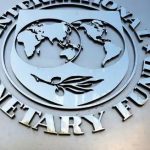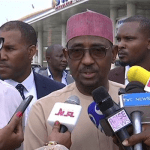In the first half of 2023, Nigeria’s product taxes increased to N1.36 trillion, according to a National Bureau of Statistics data.
This represents a 113.29 percent increase over the N636.19 billion earned in the first half of 2021 and a 25.00 percent increase over the N1.09 trillion earned in the same period of 2022.
This is based on current basic pricing and is contained in the National Bureau of Statistics on Net Indirect Taxes on Products.
Adjusted for inflation, product taxes amounted to N465.94bn in the first six months of 2023, a 34.98 percent increase from the N345.19bn reported in the same period in 2021, and an 11.94 percent increase from the N416.23bn reported in the same time in 2022.

According to the World Bank, net indirect taxes (taxes less subsidies on products) are the sum of product taxes less subsidies. It stated that product taxes are taxes payable by producers as they relate to the production, sale, purchase, or use of the goods and services.
However, the rise in product taxes year-on-year comes despite falling purchasing power in the country with inflation hitting 22.79 percent in June.
According to the World Bank, the loss of purchasing power from high inflation has pushed about four million Nigerians into poverty between January and May 2023.
Inflation is expected to continue to rise and is predicted to hit 25 percent by 2023. The global bank said, “Headline inflation is expected to rise from 18.8 percent in 2022 to 25 percent in 2023.”
Meanwhile, the International Monetary Fund has urged Nigeria to raise its VAT rate to 15 per cent by 2027, which could further increase the amount generated from product tax and increase the prices of products.
But the government says it is bolstering effort to shore up revenue. In its 2023-2035 Medium Term Expenditure Framework and Fiscal Strategy Paper, the government disclosed some of its strategies adopted to achieve this.
“These measures include; improving the tax administration framework, including tax filing and payment; as well as introduction of new and/or further increases in existing pro-health taxes like excise on sugar-sweetened beverages, tobacco, and alcohol.”
In the first half of 2023, Nigeria’s product taxes increased to N1.36 trillion, according to a National Bureau of Statistics data.
This represents a 113.29 percent increase over the N636.19 billion earned in the first half of 2021 and a 25.00 percent increase over the N1.09 trillion earned in the same period of 2022.
This is based on current basic pricing and is contained in the National Bureau of Statistics on Net Indirect Taxes on Products.
Adjusted for inflation, product taxes amounted to N465.94bn in the first six months of 2023, a 34.98 percent increase from the N345.19bn reported in the same period in 2021, and an 11.94 percent increase from the N416.23bn reported in the same time in 2022.

According to the World Bank, net indirect taxes (taxes less subsidies on products) are the sum of product taxes less subsidies. It stated that product taxes are taxes payable by producers as they relate to the production, sale, purchase, or use of the goods and services.
However, the rise in product taxes year-on-year comes despite falling purchasing power in the country with inflation hitting 22.79 percent in June.
According to the World Bank, the loss of purchasing power from high inflation has pushed about four million Nigerians into poverty between January and May 2023.
Inflation is expected to continue to rise and is predicted to hit 25 percent by 2023. The global bank said, “Headline inflation is expected to rise from 18.8 percent in 2022 to 25 percent in 2023.”
Meanwhile, the International Monetary Fund has urged Nigeria to raise its VAT rate to 15 per cent by 2027, which could further increase the amount generated from product tax and increase the prices of products.
But the government says it is bolstering effort to shore up revenue. In its 2023-2035 Medium Term Expenditure Framework and Fiscal Strategy Paper, the government disclosed some of its strategies adopted to achieve this.
“These measures include; improving the tax administration framework, including tax filing and payment; as well as introduction of new and/or further increases in existing pro-health taxes like excise on sugar-sweetened beverages, tobacco, and alcohol.”
In the first half of 2023, Nigeria’s product taxes increased to N1.36 trillion, according to a National Bureau of Statistics data.
This represents a 113.29 percent increase over the N636.19 billion earned in the first half of 2021 and a 25.00 percent increase over the N1.09 trillion earned in the same period of 2022.
This is based on current basic pricing and is contained in the National Bureau of Statistics on Net Indirect Taxes on Products.
Adjusted for inflation, product taxes amounted to N465.94bn in the first six months of 2023, a 34.98 percent increase from the N345.19bn reported in the same period in 2021, and an 11.94 percent increase from the N416.23bn reported in the same time in 2022.

According to the World Bank, net indirect taxes (taxes less subsidies on products) are the sum of product taxes less subsidies. It stated that product taxes are taxes payable by producers as they relate to the production, sale, purchase, or use of the goods and services.
However, the rise in product taxes year-on-year comes despite falling purchasing power in the country with inflation hitting 22.79 percent in June.
According to the World Bank, the loss of purchasing power from high inflation has pushed about four million Nigerians into poverty between January and May 2023.
Inflation is expected to continue to rise and is predicted to hit 25 percent by 2023. The global bank said, “Headline inflation is expected to rise from 18.8 percent in 2022 to 25 percent in 2023.”
Meanwhile, the International Monetary Fund has urged Nigeria to raise its VAT rate to 15 per cent by 2027, which could further increase the amount generated from product tax and increase the prices of products.
But the government says it is bolstering effort to shore up revenue. In its 2023-2035 Medium Term Expenditure Framework and Fiscal Strategy Paper, the government disclosed some of its strategies adopted to achieve this.
“These measures include; improving the tax administration framework, including tax filing and payment; as well as introduction of new and/or further increases in existing pro-health taxes like excise on sugar-sweetened beverages, tobacco, and alcohol.”
In the first half of 2023, Nigeria’s product taxes increased to N1.36 trillion, according to a National Bureau of Statistics data.
This represents a 113.29 percent increase over the N636.19 billion earned in the first half of 2021 and a 25.00 percent increase over the N1.09 trillion earned in the same period of 2022.
This is based on current basic pricing and is contained in the National Bureau of Statistics on Net Indirect Taxes on Products.
Adjusted for inflation, product taxes amounted to N465.94bn in the first six months of 2023, a 34.98 percent increase from the N345.19bn reported in the same period in 2021, and an 11.94 percent increase from the N416.23bn reported in the same time in 2022.

According to the World Bank, net indirect taxes (taxes less subsidies on products) are the sum of product taxes less subsidies. It stated that product taxes are taxes payable by producers as they relate to the production, sale, purchase, or use of the goods and services.
However, the rise in product taxes year-on-year comes despite falling purchasing power in the country with inflation hitting 22.79 percent in June.
According to the World Bank, the loss of purchasing power from high inflation has pushed about four million Nigerians into poverty between January and May 2023.
Inflation is expected to continue to rise and is predicted to hit 25 percent by 2023. The global bank said, “Headline inflation is expected to rise from 18.8 percent in 2022 to 25 percent in 2023.”
Meanwhile, the International Monetary Fund has urged Nigeria to raise its VAT rate to 15 per cent by 2027, which could further increase the amount generated from product tax and increase the prices of products.
But the government says it is bolstering effort to shore up revenue. In its 2023-2035 Medium Term Expenditure Framework and Fiscal Strategy Paper, the government disclosed some of its strategies adopted to achieve this.
“These measures include; improving the tax administration framework, including tax filing and payment; as well as introduction of new and/or further increases in existing pro-health taxes like excise on sugar-sweetened beverages, tobacco, and alcohol.”
In the first half of 2023, Nigeria’s product taxes increased to N1.36 trillion, according to a National Bureau of Statistics data.
This represents a 113.29 percent increase over the N636.19 billion earned in the first half of 2021 and a 25.00 percent increase over the N1.09 trillion earned in the same period of 2022.
This is based on current basic pricing and is contained in the National Bureau of Statistics on Net Indirect Taxes on Products.
Adjusted for inflation, product taxes amounted to N465.94bn in the first six months of 2023, a 34.98 percent increase from the N345.19bn reported in the same period in 2021, and an 11.94 percent increase from the N416.23bn reported in the same time in 2022.

According to the World Bank, net indirect taxes (taxes less subsidies on products) are the sum of product taxes less subsidies. It stated that product taxes are taxes payable by producers as they relate to the production, sale, purchase, or use of the goods and services.
However, the rise in product taxes year-on-year comes despite falling purchasing power in the country with inflation hitting 22.79 percent in June.
According to the World Bank, the loss of purchasing power from high inflation has pushed about four million Nigerians into poverty between January and May 2023.
Inflation is expected to continue to rise and is predicted to hit 25 percent by 2023. The global bank said, “Headline inflation is expected to rise from 18.8 percent in 2022 to 25 percent in 2023.”
Meanwhile, the International Monetary Fund has urged Nigeria to raise its VAT rate to 15 per cent by 2027, which could further increase the amount generated from product tax and increase the prices of products.
But the government says it is bolstering effort to shore up revenue. In its 2023-2035 Medium Term Expenditure Framework and Fiscal Strategy Paper, the government disclosed some of its strategies adopted to achieve this.
“These measures include; improving the tax administration framework, including tax filing and payment; as well as introduction of new and/or further increases in existing pro-health taxes like excise on sugar-sweetened beverages, tobacco, and alcohol.”
In the first half of 2023, Nigeria’s product taxes increased to N1.36 trillion, according to a National Bureau of Statistics data.
This represents a 113.29 percent increase over the N636.19 billion earned in the first half of 2021 and a 25.00 percent increase over the N1.09 trillion earned in the same period of 2022.
This is based on current basic pricing and is contained in the National Bureau of Statistics on Net Indirect Taxes on Products.
Adjusted for inflation, product taxes amounted to N465.94bn in the first six months of 2023, a 34.98 percent increase from the N345.19bn reported in the same period in 2021, and an 11.94 percent increase from the N416.23bn reported in the same time in 2022.

According to the World Bank, net indirect taxes (taxes less subsidies on products) are the sum of product taxes less subsidies. It stated that product taxes are taxes payable by producers as they relate to the production, sale, purchase, or use of the goods and services.
However, the rise in product taxes year-on-year comes despite falling purchasing power in the country with inflation hitting 22.79 percent in June.
According to the World Bank, the loss of purchasing power from high inflation has pushed about four million Nigerians into poverty between January and May 2023.
Inflation is expected to continue to rise and is predicted to hit 25 percent by 2023. The global bank said, “Headline inflation is expected to rise from 18.8 percent in 2022 to 25 percent in 2023.”
Meanwhile, the International Monetary Fund has urged Nigeria to raise its VAT rate to 15 per cent by 2027, which could further increase the amount generated from product tax and increase the prices of products.
But the government says it is bolstering effort to shore up revenue. In its 2023-2035 Medium Term Expenditure Framework and Fiscal Strategy Paper, the government disclosed some of its strategies adopted to achieve this.
“These measures include; improving the tax administration framework, including tax filing and payment; as well as introduction of new and/or further increases in existing pro-health taxes like excise on sugar-sweetened beverages, tobacco, and alcohol.”
In the first half of 2023, Nigeria’s product taxes increased to N1.36 trillion, according to a National Bureau of Statistics data.
This represents a 113.29 percent increase over the N636.19 billion earned in the first half of 2021 and a 25.00 percent increase over the N1.09 trillion earned in the same period of 2022.
This is based on current basic pricing and is contained in the National Bureau of Statistics on Net Indirect Taxes on Products.
Adjusted for inflation, product taxes amounted to N465.94bn in the first six months of 2023, a 34.98 percent increase from the N345.19bn reported in the same period in 2021, and an 11.94 percent increase from the N416.23bn reported in the same time in 2022.

According to the World Bank, net indirect taxes (taxes less subsidies on products) are the sum of product taxes less subsidies. It stated that product taxes are taxes payable by producers as they relate to the production, sale, purchase, or use of the goods and services.
However, the rise in product taxes year-on-year comes despite falling purchasing power in the country with inflation hitting 22.79 percent in June.
According to the World Bank, the loss of purchasing power from high inflation has pushed about four million Nigerians into poverty between January and May 2023.
Inflation is expected to continue to rise and is predicted to hit 25 percent by 2023. The global bank said, “Headline inflation is expected to rise from 18.8 percent in 2022 to 25 percent in 2023.”
Meanwhile, the International Monetary Fund has urged Nigeria to raise its VAT rate to 15 per cent by 2027, which could further increase the amount generated from product tax and increase the prices of products.
But the government says it is bolstering effort to shore up revenue. In its 2023-2035 Medium Term Expenditure Framework and Fiscal Strategy Paper, the government disclosed some of its strategies adopted to achieve this.
“These measures include; improving the tax administration framework, including tax filing and payment; as well as introduction of new and/or further increases in existing pro-health taxes like excise on sugar-sweetened beverages, tobacco, and alcohol.”
In the first half of 2023, Nigeria’s product taxes increased to N1.36 trillion, according to a National Bureau of Statistics data.
This represents a 113.29 percent increase over the N636.19 billion earned in the first half of 2021 and a 25.00 percent increase over the N1.09 trillion earned in the same period of 2022.
This is based on current basic pricing and is contained in the National Bureau of Statistics on Net Indirect Taxes on Products.
Adjusted for inflation, product taxes amounted to N465.94bn in the first six months of 2023, a 34.98 percent increase from the N345.19bn reported in the same period in 2021, and an 11.94 percent increase from the N416.23bn reported in the same time in 2022.

According to the World Bank, net indirect taxes (taxes less subsidies on products) are the sum of product taxes less subsidies. It stated that product taxes are taxes payable by producers as they relate to the production, sale, purchase, or use of the goods and services.
However, the rise in product taxes year-on-year comes despite falling purchasing power in the country with inflation hitting 22.79 percent in June.
According to the World Bank, the loss of purchasing power from high inflation has pushed about four million Nigerians into poverty between January and May 2023.
Inflation is expected to continue to rise and is predicted to hit 25 percent by 2023. The global bank said, “Headline inflation is expected to rise from 18.8 percent in 2022 to 25 percent in 2023.”
Meanwhile, the International Monetary Fund has urged Nigeria to raise its VAT rate to 15 per cent by 2027, which could further increase the amount generated from product tax and increase the prices of products.
But the government says it is bolstering effort to shore up revenue. In its 2023-2035 Medium Term Expenditure Framework and Fiscal Strategy Paper, the government disclosed some of its strategies adopted to achieve this.
“These measures include; improving the tax administration framework, including tax filing and payment; as well as introduction of new and/or further increases in existing pro-health taxes like excise on sugar-sweetened beverages, tobacco, and alcohol.”














